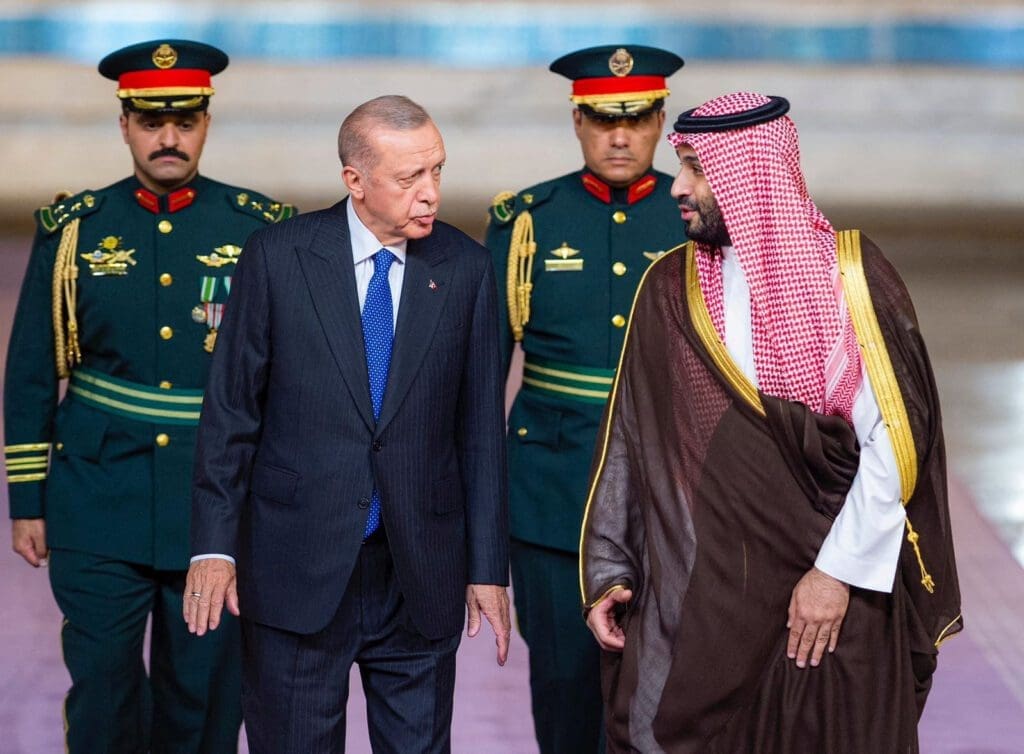Weeks after winning a new five-year term as president of Türkiye, Recep Tayyip Erdogan visited Saudi Arabia, the United Arab Emirates and Qatar with a delegation that included nearly 200 business and government officials. The veteran leader’s first visit to the region since his electoral victory in May is the culmination of a rapid reconciliation process that began in 2022, following years of tension in Ankara’s relations with both major Arab Gulf power centers, Riyadh and Abu Dhabi.
Erdogan’s visit, during which he signed a string of multi-billion-dollar investment deals, offers a glimpse of what to expect from Türkiye’s foreign policy over the coming half-decade, based on a reset of relations and efforts to cooperate more closely with Saudi Arabia and the UAE, as well as maintaining strong ties with Qatar.
Regional Rethink
Gulf leaders were among the very first foreign officials to congratulate Erdogan after his recent election victory. Even before the vote, the Gulf countries had conducted massive humanitarian aid campaigns following the devastating earthquake that hit Türkiye—and Syria—in February, marking a major improvement in their recent relations.
More broadly, a wave of changes in the region and in Türkiye’s domestic politics have prompted the government to rethink its policies on several issues, including its relationship with its once-bitter rival Egypt, and its involvement in conflicts in Syria and Libya. When it comes to the oil-rich monarchies of the Gulf Cooperation Council (GCC), Türkiye’s economic crisis has given it a pressing motivation for shoring up relations, especially with those states with which it has fiercely contested for regional influence over the past decade. Ankara is hoping that an influx of both public and private Gulf investment could help ease its grinding financial crisis.
While in the UAE, Erdogan signed $50 billion-worth of deals in 13 sectors including energy, transportation, infrastructure, defense and artificial intelligence. In Saudi Arabia, his central focus was on boosting economic and defense cooperation, based on deals involving energy, investment, media and arms manufacture.
In Qatar, Erdogan’s visit coincided with the 50-year anniversary of Türkiye-Qatar diplomatic relations—the recent history of which has been altogether different than the other Gulf states, owing to their ideological affinities during the Arab Spring and Ankara’s vital cooperation with Doha during the blockade imposed on Qatar by Saudi Arabia and the UAE in 2017.
It is important to underline that although Erdogan visited the three countries in a single brief tour, he treated each separately and tailored his approach to their respective interests. The UAE and Saudi Arabia have each had difficult relations with Türkiye since the Arab uprisings of 2011, including but not limited to tensions over their divergent stances on the Muslim Brotherhood. Ankara’s relations with Abu Dhabi went cold after reports that the UAE was involved in the 2016 attempted coup d’état against Erdogan. The assassination of Saudi dissident journalist Jamal Khashoggi at the kingdom’s Istanbul consulate, reportedly ordered by senior Saudi officials, triggered similar tensions with Riyadh. Both the UAE and Saudi Arabia, for their part, were rankled by Türkiye’s support for Qatar during the their three-and-a-half-year blockade of the emirate.
However, the end of that siege in 2021 opened the door to rebuilding ties with Ankara, as well. For Gulf leaders today, Türkiye has evolved into an ally that offers investment opportunities, technology transfer and cooperation on regional issues. While this rapid shift is still underway, the economic and security agreements Erdogan signed during his visit point toward further improvements over the coming five years.
For the leaders in Riyadh, Doha and Abu Dhabi, as well as for Erdogan, a long-term strategic partnership between GCC members and Türkiye offers advantages. Saudi Crown Prince and de facto ruler Mohammad Bin Salman, the UAE’s Mohammed Bin Zayed, and Qatar’s Tamim bin Hamad are all leaders of capital-rich but energy export-dependent countries looking to transform their rentier economies and political systems with limited reforms and rapidly implemented economic projects in order to wean their economies off oil and gas.
It is worth noting that during Erdogan’s visit, Saudi Investment Minister Khalid Bin Abdulaziz Al-Falih invited Turkish companies to take part in the country’s Vision 2030 reform initiative, the central focus in Mohammad bin Salman’s domestic policy agenda.
This is important, as the newly elected president and the crown prince both mesh their long-term domestic objectives with their external relations. While Turkish companies and workers stand to benefit from involvement in the $3-trillion plan with contracts and jobs, Turkey offers Saudi Arabia a business partnership that could provide added benefits of having a steady stream of low-cost labor and material transfer.
A push to boost cooperation on arms production is another significant example of this drive. Erdogan’s GCC visit came as a deal was concluded between Türkiye’s private arms firm Baykar Teknoloji and the Saudi Defense Ministry to produce Akinci combat drones for the Saudi military. The firm is also set to provide technical, logistic and educational services to the army, according to Baykar.
Saudi Arabia will not only acquire drones but also start manufacturing them on its own soil with Turkish help, bolstering Saudi defenses—as per Vision 2030. The value of the defense agreement has not been made public, but Baykar’s CEO Haluk Bayraktar said it was “the biggest defense and aviation export contract in Türkiye’s history.”
In short, Erdogan’s brief tour of the Gulf signals that an intensification in bilateral and regional cooperation can be expected. The question now is whether the normalization of their relations, which is essentially based on the logic of improving economic relations, can translate into more cooperation on mutually important political issues in the region, over which there has been significant discord. Indeed, the relatively rapid speed at which rapprochement between Ankara, Riyadh and Abu Dhabi has occurred has left the underlying political tensions between them largely unresolved.
The bet is that their overlapping and mutual interests based on long-term economic investment strategies could help this process and encourage them to cooperate further across the region in the coming years. Türkiye and the Gulf countries could, for example, collaborate over peace plans for Syria and Libya, or take gradual steps to normalize their difficult relations with third parties such as Egypt. For the time being, it is not clear whether any of this will transpire. But Erdogan’s visit indicates that the era of acute tensions between Ankara and the Gulf is over, and that shared economic interests within a long-term strategy could indeed lead to more political cooperation going forward.
The opinions expressed in this article are those of the author and do not necessarily reflect the views of the Middle East Council on Global Affairs.


